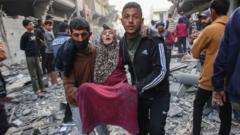Amnesty International has leveled serious accusations against Israel, alleging that the nation is committing genocide against Palestinians in the ongoing Gaza conflict. The UK-based human rights organization based its assessment on a comprehensive investigation that included witness testimonies, digital evidence, and what it termed "dehumanising and genocidal statements" made by Israeli officials. Amnesty's Secretary General, Agnès Callamard, stated that the report should serve as “a wake-up call” to the international community.
In response, Israel's Foreign Ministry condemned the 295-page report, calling it “entirely false and based on lies.” The Israeli military also dismissed the claims, arguing that they are “entirely baseless” and fail to consider the operational realities that its forces confront. The escalation of violence has led to local medical reports indicating that at least 50 Palestinians lost their lives due to Israeli strikes in Gaza within a single day. Many of the reported casualties occurred in the al-Mawasi tent camp for displaced persons, where Israeli forces assert they were targeting Hamas operatives.
Amnesty International posits that their extensive research has provided a robust basis to conclude that Israel has been engaging in genocidal actions, which they define as acts committed with the intent to destroy a specific national, ethnical, racial, or religious group. The complexities of international law, notably the 1948 Genocide Convention following the horrors of the Holocaust, frame this grave charge.
Callamard further elaborated that Israeli actions against Palestinians include systematic killings, purposeful infliction of mental and physical harm, and the establishment of life-threatening conditions intended to facilitate physical destruction. As the international community watches closely, the International Court of Justice (ICJ) in The Hague is deliberating on accusations brought forth by South Africa alleging that Israel's actions in Gaza amount to genocide. Israel has characterized South Africa's claims as "wholly unfounded."
Furthermore, the humanitarian crisis has deepened, with reports from medical professionals indicating that the total death toll in Gaza has exceeded 44,532, primarily civilians, since the commencement of the conflict. As Israeli military operations continue, including recent airstrikes that left clusters of casualties and extensive destruction, the narrative surrounding the conflict remains contentious.
Scenes of devastation have emerged from impacted zones, with reports detailing fatalities of innocent children and civilians caught in the crossfire. Many survivors recount experiences of sudden and catastrophic violence against previously believed-safe areas. Amidst all this, Israel's military maintains that they are conducting operations to neutralize Hamas, claiming to take necessary precautions to minimize civilian harm while accusing Hamas of using civilians as shields.
As both sides of this conflict present starkly divergent perspectives, the humanitarian implications and ongoing violence demand a careful examination and dialogue within the international arena to address the pressing situation and seek resolution.



















